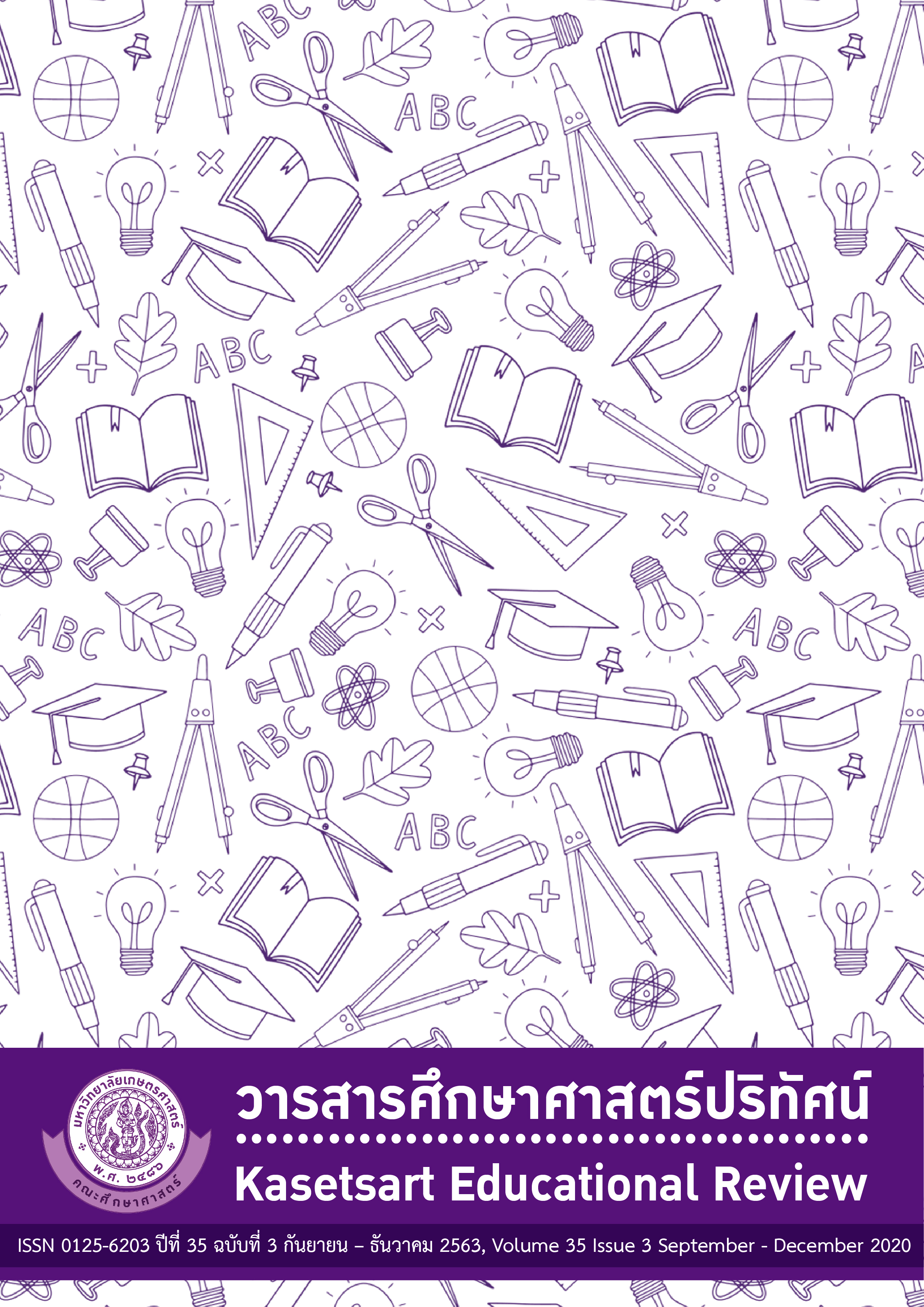การประเมินผลหลักสูตรวิทยาศาสตรมหาบัณฑิต สาขาวิชานันทนาการ มหาวิทยาลัยเกษตรศาสตร์
คำสำคัญ:
การประเมินผล, หลักสูตรวิทยาศาสตรมหาบัณฑิต สาขาวิชานันทนาการบทคัดย่อ
วัตถุประสงค์ของงานวิจัยนี้เพื่อประเมินหลักสูตรวิทยาศาสตรมหาบัณฑิต สาขาวิชานันทนาการ คณะศึกษาศาสตร์ มหาวิทยาลัยเกษตรศาสตร์ ประชากรคือนิสิตที่กำลังศึกษาหลักสูตร วท.ม. (นันทนาการ) จำนวน 4 คน บัณฑิต วท.ม. (นันทนาการ) 30 คน และผู้ใช้บัณฑิต ฯ อีก 30 คน รวมทั้งหมด 64 คน เครื่องมือวิจัยเป็นแบสอบถามที่ผู้วิจัยสร้างขึ้น (Self-Administered Questionnaire) จำนวน 3 ฉบับ ได้แก่ 1. แบบประเมินหลักสูตรวิทยาศาสตรมหาบัณฑิต สาขาวิชานันทนาการ สำหรับนิสิตที่กำลังศึกษา (ค่า IOC =0.80-1.00 reliability = 0.87 ) 2. แบบประเมินหลักสูตรวิทยาศาสตรมหาบัณฑิต สาขาวิชานันทนาการ สำหรับผู้ที่สำเร็จการศึกษาวิทยาศาสตรมหาบัณฑิต สาขาวิชานันทนาการ (IOC =0.60-1.00 reliability = 0.94) และ 3. แบบประเมินความคิดเห็นของผู้บริหารที่มีต่อประสิทธิภาพในการทำงานของบัณฑิตที่สำเร็จการศึกษาหลักสูตรวิทยาศาสตรมหาบัณฑิต สาขาวิชานันทนาการ(IOC =0.80-1.00 reliability = 0.81) รวบรวมข้อมูลโดยวิธีการส่งแบบสอถามทางไปรษณีย์และจดหมายอิเล็กทรอนิกส์ (E-mail) ได้ข้อมูลกลับคืนมาจำนวน 45 ชุด (นิสิต 4 บัณฑิต 26 และ ผู้ใช้บัณฑิต15) คิดเป็นร้อยละ 70.31 วิเคราะห์ข้อมูลโดยใช้ค่าความถี่ ค่าร้อยละและค่าเฉลี่ย
ผลการวิจัยพบว่า: - 1) นิสิตที่กำลังศึกษา มีความคิดเห็นต่อการเรียนการสอนในหลักสูตรวิทยาศาสตรมหาบัณฑิต สาขาวิชานันทนาการ โดยรวมอยู่ในระดับมากที่สุด (= 3.65) และมีความคิดเห็นต่อหลักสูตรวิทยาศาสตรมหาบัณฑิต สาขาวิชานันทนาการ โดยรวมอยู่ในระดับมากที่สุด (= 3.84), 2) ผู้ที่สำเร็จการศึกษามีความคิดเห็นต่อหลักสูตรการเรียนการสอนหลักสูตรวิทยาศาสตรมหาบัณฑิต สาขาวิชานันทนาการ โดยรวมอยู่ในระดับมาก (= 3.47) และ 3) ผู้บริหารของบัณฑิตที่สำเร็จการศึกษาหลักสูตรวิทยาศาสตรมหาบัณฑิต สาขาวิชานันทนาการ มีความคิดเห็นต่อประสิทธิภาพในการทำงานของบัณฑิตหลักสูตรวิทยาศาสตรมหาบัณฑิต สาขาวิชานันทนาการ โดยรวมอยู่ในระดับมากที่สุด (= 3.62)
เอกสารอ้างอิง
Bureau of Higher Education Monitoring and Evaluation, Office of the Higher Education Commission (2017). The benchmark for higher education courses in 2558 and related benchmark. Bangkok: Wongsawang Publishing & Printer Co., Ltd. (in Thai).
Department of Physical Education Ministry of Tourism. (2017). National Recreation Plan No. 3 (2560-2564 BC). Bangkok: Ideas Square Publishing, Inc. (in Thai).
Ennis, C. D. (2004). Physical Education Curriculum Development Workshop. The Twin Tower Hotel, Bangkok, 24-27 August 2004.
Galluzzo, G R. & Craig, J. R. (1990). Evaluation of Preservice Teacher Education Programs In W. R. Houston, M. Haberman, & J. Sikula(Eds.), Handbook of Research on Teacher Education (pp. 599-616). NY: Macmillan.
Guidelines of the Ministry of education on the management of higher education curriculum standards (2558, 13 November). The Government Gazette 132 (Special 295 D) page 14. (in Thai).
Henderson, K. (2016). “Leisure and the Academy: Curriculum and Scholarship in Higher Education”. In Walker, G. J., Scott, D., and Stoddoka, M. (Eds.). Leisure Matters: The State and Future of Leisure Studies. PA: Venture Publishing, Inc.
Kejpridaburisot, B. (2004). Social sciences research methodology. (8th print). Bangkok: Chamchuri printing factory. (in Thai).
Lehmongkol, P., Samahito, C., Butkatunyoo, O., Sawangchareon, P., Hirunchalothorn, P. (2017). The Study of Master of Education Curriculum (Improved Version B.E. 2560), Early Childhood Education, Faculty of Education, Kasetsart University. Kasetsart Educational Review. 32 (2), p. 73-80. (in Thai).
Lund, J and Tannehill, D. (2015). Standards-Based Physical Education Curriculum Development. MA: Jones & Bartlett Learning.
Mitchell, S. A. and Walton-Fisette, (Eds.). (2016). The Essentials of Teaching Physical Education: Curriculum, Instruction, and Assessment. IL: Human Kinetics.
Office of the Higher Education Commission. (2015). Higher Education Quality Assurance Guide for students in 2014. Nontaburi: Parbpim Printing. (in Thai).
Office of the National Economics and Social Development Council. (2017). National Economic and Social Development Plan No. 12 (AD 2560-2564). Bangkok: Office of the National Economic and Social Development Board. (in Thai).
Stufflebeam, D. L. (1982). Explorations in the Evaluation of Teacher Education. In S. M. Hord, T.V. Savage, & L. J. Bethel(Eds.), Towards Usable Strategies for Teacher Education Program Evaluation (pp. 131-168). TX: University of Texas R & D Center for Teacher Education.
Yamsang, N. (2017). The evaluation of master of education in mathematics education faculty of education, ramkhamhaeng university. VRU Research and Development Journal Humanities and Social Science.12 (1), p. 95-103. (in Thai).
ดาวน์โหลด
เผยแพร่แล้ว
ฉบับ
ประเภทบทความ
สัญญาอนุญาต
บทความทุกบทความเป็นลิขสิทธิ์ของวารสารคณะศึกษาศาสตร์ มหาวิทยาลัยเกษตรศาสตร์ วิทยาเขตบางเขน
วารสารศึกษาศาสตร์ปริทัศน์ (Kasetsart Educational Review)






